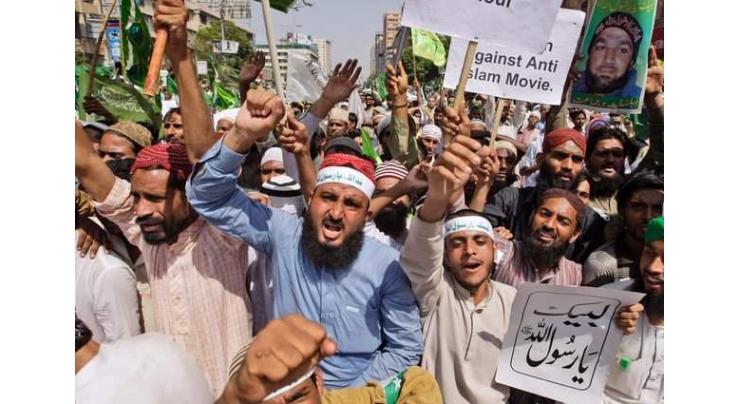
Non-Muslim Pakistanis Enjoy Freedom, State Patronage: Kundi
Faizan Hashmi Published April 25, 2024 | 09:47 PM

Central Information Secretary of Pakistan People's Party and former Deputy Speaker of the National Assembly, Faisal Karim Kundi, Thursday said that people from diverse religious backgrounds in Pakistan are experiencing the liberty to observe their faiths and engage in mutual celebrations
ISLAMABAD, (UrduPoint / Pakistan Point News - 25th Apr, 2024) Central Information Secretary of Pakistan People's Party and former Deputy Speaker of the National Assembly, Faisal Karim Kundi, Thursday said that people from diverse religious backgrounds in Pakistan are experiencing the liberty to observe their faiths and engage in mutual celebrations.
Speaking at the International Interfaith/Religious Harmony Conference, he emphasized the state's unwavering commitment to safeguarding the rights of its citizens.
Faisal Karim Kundi emphasized the importance of fostering dialogue to uphold the cherished principles of social and religious diversity, promoting national cohesion.
Organised by the Sustainable Social Development Organization (SSDO) and All Neighbors USA, the summit aimed to catalyze dialogue, collaboration, and mutual understanding among varied religious and cultural communities within Pakistan and beyond.
The International Religious Freedom and Interfaith Harmony Summit, bringing together a diverse range of global leaders, religious figures, government officials, and civil society representatives, took place on April 25, 2024, at the Marriott Hotel Islamabad.
The summit emphasized religious freedom and interfaith harmony as crucial elements for peace, development, and social cohesion amidst rising challenges to religious freedom and escalating extremism and intolerance globally.
Serving as a platform for exchanging ideas, sharing best practices, and exploring innovative approaches to promote religious tolerance and understanding, the event was graced by distinguished speakers and experts from various backgrounds, including government officials, religious leaders, and representatives of international organizations.
Syed Kausar Abbas, Executive Director of SSDO, underscored the significance of interfaith harmony and the role of religious communities in Pakistan, stressing the need to align state policies with the vision articulated in the August 11th address by Quaid-e-Azam.
Ilyas Masih, President of All Neighbors USA, emphasized the significance of hosting the summit in Pakistan.
Addressing the audience, Kate Somvongsiri, Acting Deputy Chief of Mission, U.S. Embassy Islamabad congratulated SSDO and All Neighbors USA for convening such a diverse group of experts, theologians and men and women of faith to reflect on how everyone can contribute to a more peaceful, more tolerant, and more just society for all Pakistanis.
She said: “It is also important to protect the extraordinarily good that people of faith can do to promote peace, to care for the sick, to protect our planet, to expand opportunity for underserved communities, and so much more.”
The U.S. delegation, represented by Dr. Jack Haye (President, Henry College) and Dr. Joseph Knight and Ilyas Masih (President-All Neighbors USA) shared insights and best practices from their experiences in the USA to further advance peace, harmony, and social cohesion in Pakistan. Ayesha Raza Farooq (Chairperson National Commission on the Rights of Child) shared insights of the minority children rights. A panel discussion featuring Iqbal Ahmed Detho (Chairman Sindh Human Rights Commission), Sukhdev Assardas Hemani (Member Sindh human rights commission govt of Sindh), Ms Afshan Tehseen (Former Chairperson NCRC) and Muhammad Shahid Khan (Director-SSDO) and Dr. Ehsan Sadiq (Director General, National Police Bureau) delved into practical solutions for fostering peace, interfaith harmony, and meaningful dialogue and collaboration among all religious and faith communities in Pakistan.
The summit welcomed participants from across the United States and Pakistan, including clergy members, Pandits, Muslims, Sikhs, and Baha'i community scholars, all sharing a commitment to advancing religious freedom, promoting interfaith understanding, and bridging divides across cultures and beliefs.
Related Topics
Recent Stories

Bugti assures transporters for addressing their problems

Deputy Prime Minister and Foreign Minister, Mohammad Ishaq Dar meets foreign min ..

3 drug peddlers arrested, hashish recovered

1496,990 children given polio drops in five days: DC

Six terrorists killed, hideout busted in N Waziristan IBO: ISPR

Pakistan, Qatar agree to further expand trade, investment ties

Sindh cabinet approves Rs177.5m to strengthen, mobilize various wings of police

Faisal Karim Kundi takes oath as new KP Governor

Azad Jammu and Kashmir Prime Minister Anwaar ul Haq Chaudhry seeks more vibrant ..

Tahaffuz Manzil Foster Home providing care & support to homeless children

PCB proposes April 7 -May 20 window; tweaks in rules for HBL PSL 2025

Field hospitals now operational across Punjab: Azma Bukhari
More Stories From Pakistan
-
Anwaar urges religious scholars to play role in fostering unity, solidarity
10 hours ago -

Bugti assures transporters for addressing their problems
10 hours ago -

Deputy Prime Minister and Foreign Minister, Mohammad Ishaq Dar meets foreign minister of Egypt
10 hours ago -

3 drug peddlers arrested, hashish recovered
10 hours ago -

1496,990 children given polio drops in five days: DC
10 hours ago -

Six terrorists killed, hideout busted in N Waziristan IBO: ISPR
10 hours ago
-

Pakistan, Qatar agree to further expand trade, investment ties
10 hours ago -

Sindh cabinet approves Rs177.5m to strengthen, mobilize various wings of police
10 hours ago -

Faisal Karim Kundi takes oath as new KP Governor
10 hours ago -

Azad Jammu and Kashmir Prime Minister Anwaar ul Haq Chaudhry seeks more vibrant role of lawyers for ..
10 hours ago -

Tahaffuz Manzil Foster Home providing care & support to homeless children
10 hours ago -

Field hospitals now operational across Punjab: Azma Bukhari
10 hours ago










